



Medical Pioneer
Dr. George Denny left his mark
on Madison, Ind.’s medical community
He operated the Denny Sanitarium
and built Hillside and Victoria Inns
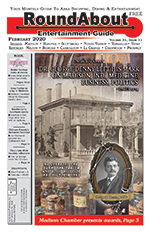 |
February 2020 Cover |
(February 2020) – Not long after Madison, Ind., celebrated the opening of the King’s Daughters’ Hospital in 1899, Dr. George Elmer Denny returned to Madison in 1901 and started his own private hospital – Dr. Denny’s Sanitarium. The large, white painted brick building at the foot of the Hwy.421 hill at 601 Jefferson St. still stands as a reminder of that period in Madison’s history when Denny’s medical practice was at the forefront of the town’s early and developing medical care.
The property is now owned by Sharon and Dave Daghir, who live there. “When we would drive by this house with the stained-glass window at the side entrance, I would say to Dave that somebody should buy this place and fix it up,” Sharon said. Eventually, it was the Daghirs who bought the massive house 17 years ago. As the new owners, they became interested in the history of the house.
That history starts with the story of a talented and entrepreneurial physician who turned a massive old house into a modern medical facility in 1901. The success of Denny’s Sanitarium propelled the physician into leadership roles in the medical field and in the business community in the early 1900s. He personally invested in the growth and development of the city of Madison through the construction and management of two hotels and other business ventures. He continued that commitment to his hometown by representing Jefferson County, plus Scott County, in the Indiana State Legislature in the 1930s. His impact as a physician is still remembered by current Madison residents.
In her exhaustive research of the property, Sharon Daghir learned that Denny purchased the house from the Scheik family. She refers to the original owner, Philip Scheik as “the Frenchman who built the house in 1854.”
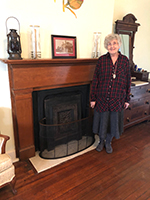 |
Photo by Building owner Sharon Daghir poses beside an original fireplace in what was once Dr. Denny’s Sanitarium in Madison, Ind. She and her husband, Dave, live at the house at 605 Jefferson St. |
Denny was a local farm boy born in Bryantsburg, Ind., on March 23, 1870. He completed a public education in the county then attended Hanover College from 1887-88. He worked as a teacher from 1888-1891. He then continued his education at Franklin College in Franklin, Ind., from 1891-92. He attended medical school in Cincinnati, then at the University of Louisville, where he earned his M.D. in 1893.
That same year, he married Jennie Childs, a fellow student from Franklin College. They moved to Alert, Ind., where he began his medical practice. Their daughter, Leota Rose, was born there in 1895. By 1898, Denny had decided to pursue post-graduate study in Chicago. He completed the program at Chicago City Hospital from 1899-1900. During the last six months of this residency, Denny served as the Head Physician. When he moved to Madison in 1901, he listed his specialties as surgery and diseases of women.
Management for Dr Denny’s Sanitarium was provided by Denny as its president; his brother, Dr. Charles W. Denny, vice president; and his wife, Jennie, secretary-treasurer. In the early 1900s it was common for women to work as nurses-in-training for two or three years. Those trainees covered the basic staffing needs in hospitals. After completing this training, the nurses could work elsewhere as a certified nurse.
This new facility opened with 10 beds, plus the latest scientific apparatus. Dr. Alpha Childs, Jennie’s brother, had also moved to Madison. Childs brought one of the first X-Ray machines available. He specialized in physical therapy, X-Ray diagnosis and hot air therapy. The staffing and equipment at Dr. Denny’s Sanitarium brought the latest in medicine to Madison.
One of the early advertisements for the sanitarium boasted about the quiet, home-like atmosphere for the comfort of the patients. Sharon Daghir pointed out an original Federal style mantel on a fireplace on the second floor of their residence. Most of the other fireplace mantels had been replaced with more ornate, Victorian style mantels.
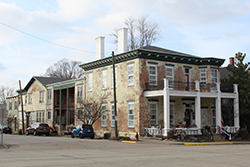 |
Photo by Don Ward The former Denny Sanitarium building as it looks today. |
“Dr. Denny probably updated his new property in 1901 to match current Victorian home design,” she said. “He also built an addition on the right side of the house, adding a curved front façade. A wide porch was constructed across the front to visually tie the addition to the original building. This addition provided additional space for the hospital and nurses in training.”
The Dennys were now settled in Madison. In 1905, they welcomed the birth of their second daughter, Neva Childs Denny.
Denny was known to have a large and successful medical practice. An advertisement in 1907 listed additional medical staff, including Dr. Charles W. Denny (Specialty, Internal Medicine), Dr. John Hodges Sherlock and Dr. Fred H. Austin. By 1909, Samson’s City Directory of Madison lists Denny not only as the president of the sanitarium, but also secretary-treasurer of the Madison Coal Co. The 1910 census shows that he owned the sanitarium free and clear, with no mortgage. Four additional staff members are listed as part of his household: Nannie Herrin, Stella Kellum, Alma Askins and Thresa Askins.
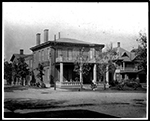 |
Photo courtesy of Jefferson County Historical Society The Denny Sanitarium as it looked in 1900s. |
By 1912, the enterprising Denny had built a new home at 605 Jefferson St. Folklore says there was a tunnel between the sanitarium and Denny’s home. However, Dave Daghir said, “We have not been able to locate a tunnel. The basement walls of the original Scheik home are over 12 inches thick. The addition to the original home only has a crawl space and not a complete foundation.”
Next, Denny took on additional responsibilities as the president and general manager of the Madison Coal Co. In 1914, his brother, Dr. Fred C. Denny, joined the staff of the sanitarium. The specialties of Fred Denny included pathology, bacteriology, chemical analysis of stomach contents, and blood analysis. Another advertisement about this time lists 10 more physicians as Associated Staff. (Drs. V. Shepherd, S.A. Whitsitt, J.H. Calvert, J.H. Christie, C.P. Harwood, C.A. Burdsell, Carl Henning, B.O. Rand, J.Q. McMahan, and Robert McKeand.)
Tragedy struck the Denny family when George’s wife, Jennie, died in 1918 after several months of failing health. Her obituary extols her virtues as “a woman of sterling character and one whose life has been a great factor in the spiritual and moral uplift of the community.”
The Dennys were members of First Baptist Church, where she was associated with all types of church work and religious causes. Jennie was also the president of the local branch of the Women’s Christian Temperance Union. She was further described as a woman whose “life will always be a source of inspiration for true Christianity to the hundreds with whom she came in contact.”
About a year later, the 49-year-old Denny married 21-year-old Roberta Tevis. His third daughter, Georgeine Tevis Denny, was born in 1921. Records from 1923 show that he no longer operated the Denny Sanitarium, but did continue to practice medicine. The 1923 W.H. Hoffman City Directory of Madison listed the addresses of 213-217 E. Fourth St. and 601 Jefferson St. as the Denny Apartments, not the Denny Sanitarium. Denny’s business was listed as the Madison Clinic, with Dr. Fred Denny listed as an eye and ear specialist at the Madison Clinic.
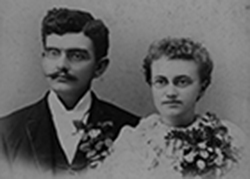 |
Photo courtesy of the HughesMontgomery.com family website Dr. George Denny and his first wife, Jenny Viola Childs, are pictured on their wedding day in 1893. |
The next venture for Denny was the construction and operation of the Hillside Hotel (now Hillside Inn), which opened in 1924. The 1925 Madison City Directory lists his office at 506 Jefferson St. and lists him as the proprietor of the Hillside Hotel. His residence was then recorded as the Hillside Hotel. Another brother, Frank Denny, managed the Hillside Hotel. Frank and his wife, Lettie, lived in one of the Denny Apartments at 217 E. Fourth St.
The Hillside Hotel was a major attraction for Madison. The hotel was described in the historical records of the Harry Lemen Collection: “The main entrance opened into a beautifully furnished lounge. The bedrooms were equipped in the most modern way and complete in every detail. The dining room had the capacity to care for 200 people. There was a solarium on the first floor. The building was constructed as near as fireproof as possible. The exterior of the building was of stucco with varied-colored bits of glass and wide piazzas with command of an excellent view.”
Edward Pierre of Indianapolis was the architect. The furniture was from Albert Pick and Co. of Chicago along with George C. Vail and Sons of Madison.
Following the success of the Hillside Hotel, Denny started construction on the Hotel Denny at 801 E. Main St. (now Victoria Inn) in the late 1920s. Apparently, construction was delayed because local columnist George H. Miller wrote about the early days of the Denny Hotel. As a teen, Miller lived with his parents at 415 Baltimore St., near the outskirts of town. He reminisced about growing up in the area, writing, “what was later the Denny and now the Whicker Manor was just the foundation of fresh poured cement that Dr. George Denny didn’t finish until probably in the 1930s. For quite a number of years, the foundation or basement was taken over by teenagers who roofed over part of it for their clubhouse, built shacks in its protected corners and in general used the entire foundation basement as the neighborhood playground.”
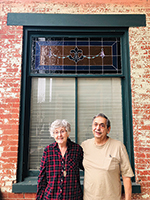 |
Photo by Sharyn Whitman Sharon and Dave Daghir pose at their home that once served as Dr. Denny’s Sanitarium. |
He continued, “I guess Doc Denny had better use for his time than to watch over several dozen teenagers, and to my knowledge, no one ever advised us to leave things alone. It was an excellent place to play hide-and-seek. A few years later, I found myself carrying newspapers to the now completed Denny Hotel when Mrs. (Roberta) Denny and Mrs. Opal Poindexter ran the place. Both women were nice to the paper boys.”
Denny and his wife, Roberta, are still listed as residing at the Hillside Hotel with their 8-year-old daughter, Georgeine, at the time of the 1930 census. Denny was a director of People’s bank of Madison, a Madison School Board trustee, a member of the Madison Board of Health, county, state and national medical associations and numerous community service organizations.
Next, this 60-year-old enterprising physician, hospital administrator, clinic manager and entrepreneur moved on to politics. He served three terms in the Indiana Legislature, representing Scott and Jefferson counties. In 1937, he was appointed superintendent of the Muscatatuck Colony for Feeble-Minded Youth, which later became a state hospital. He served there until his retirement in August 1940. Just a few months later, he died on Oct. 29 after a brief illness. At the time of his death, his residence was listed as 512 E. Main St. in Madison.
Several life-long Madison residents shared their recollections of Denny. Paulina Morris Giltner, who was born in 1918, said “We lived on Baltimore Street when I was very little. Dr. Denny came to the house one day, and I was sent over to my grandmother’s house. When I came back home, I had a new baby sister, Dorothy Morris.
Visit the former Denny Sanitarium For information, call |
“There were four Denny brothers, all doctors except one.” Giltner said the original Denny farm was located on what is now U.S. Hwy. 421, next to the location of Liberty Christian Church.
Ernestine Whittaker, a retired R.N., was born in 1926. She remembers her mother talking about Denny. Her mother had surgery at the King’s Daughters’ Hospital, where Denny was a surgeon. “At that time, white surgery patients were taken to rooms on the second floor,” she recalled. “As a black patient, my mom was taken to a bed in the basement. My mom was so scared when she woke up in that basement. As soon as she was able, she ran away. When they told Dr. Denny the patient had run away, he responded that it was too late to do anything because the patient would probably die of pneumonia.” With a smile, Whittaker added, “But she didn’t die.”
Norma Dean Heitz, born in 1928, remembers Denny as her mother’s doctor. “When I was a little girl, we lived out in the country. Dr. Denny would come out to the house to visit my mother. I remember him as a very nice man,” Heitz said.
